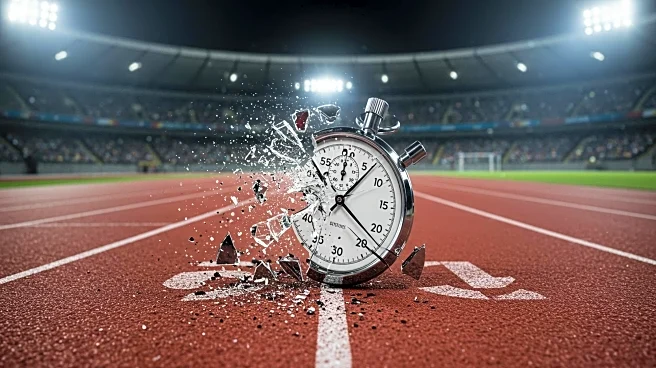What's Happening?
Fred Kerley, a prominent U.S. sprinter, has been provisionally suspended by the Athletics Integrity Unit (AIU) due to alleged 'whereabouts failures' under anti-doping regulations. Kerley, who has won silver and bronze medals in the 100 meters at the Tokyo and Paris Olympics respectively, plans to challenge the suspension. His legal team has issued a statement via Kerley's official X account, asserting that he intends to contest the allegations, arguing that one or more of the missed tests should be dismissed due to non-negligence or procedural errors by the Doping Control Officer. Kerley has expressed his determination to fight the suspension and looks forward to presenting his case before the hearing panel.
Why It's Important?
The suspension of Fred Kerley, a high-profile athlete, underscores the rigorous enforcement of anti-doping regulations in sports. This development could impact Kerley's career and reputation, as he is a significant figure in global athletics with multiple World Championships medals. The case highlights the importance of compliance with anti-doping rules and the potential consequences of violations. It also raises questions about the procedures involved in doping control and the rights of athletes to contest allegations. Kerley's situation may influence public perception of anti-doping measures and athlete accountability.
What's Next?
Kerley is expected to present his case before the appointed hearing panel, where he will challenge the allegations of 'whereabouts failures.' The outcome of this hearing could determine his eligibility to compete in future events. Meanwhile, Kerley's legal troubles continue, as he faces charges in Florida related to alleged assaults, including an incident involving a police officer. These legal issues may further complicate his athletic career and public image. Stakeholders in the athletics community will be closely monitoring the developments in Kerley's case and its implications for anti-doping enforcement.
Beyond the Headlines
Kerley's suspension and legal challenges highlight broader issues in sports, including the pressures faced by athletes and the scrutiny of their conduct both on and off the field. The case may prompt discussions about the balance between athlete privacy and the need for transparency in anti-doping efforts. Additionally, it could lead to calls for reviewing the procedures and fairness of doping control measures, potentially influencing future policy changes in sports governance.











